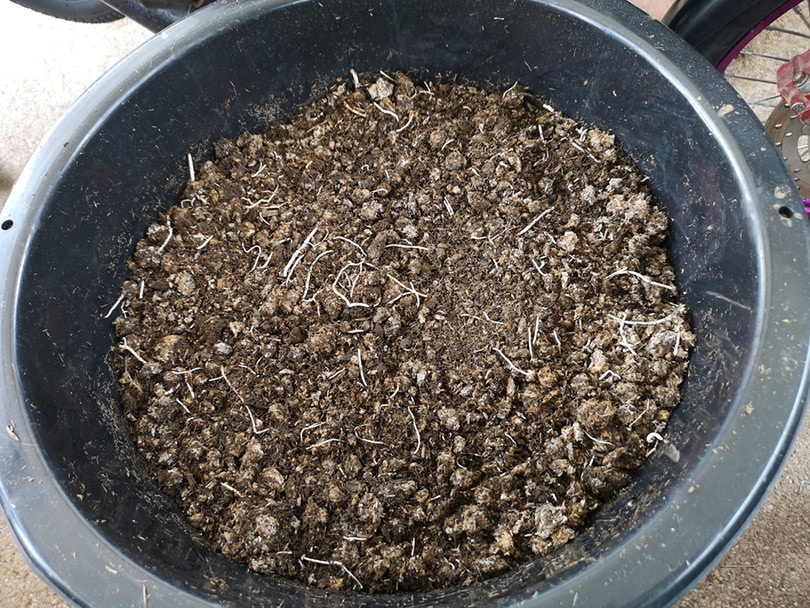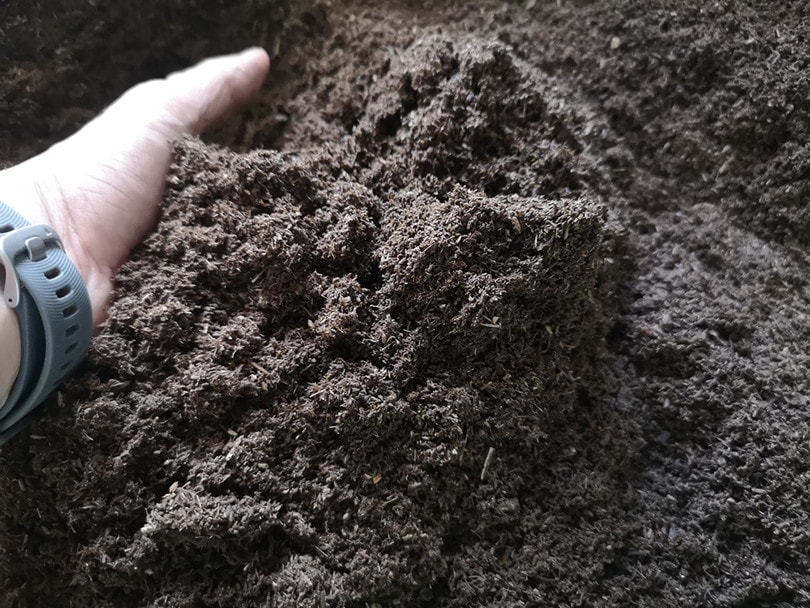Can You Compost Cheese? What You Need to Know!
-
Kristin Hitchcock
- Last updated:

Technically, you can compost cheese. It will degrade over time and eventually turn into compost. However, it will attract pests, which are typically not what you want for your compost pile. This is true for any dairy products, including milk, yogurt, and cream.
That doesn’t necessarily mean that you can not compost cheese at all. While it is one of the traditional foods that regular composters tell you to avoid, you can compost it in some situations.
With that said, if you did not want to take the chance of attracting pests, we do recommend avoiding cheese. It is one of the more difficult foods to compost, after all. Therefore, many beginners may just want to avoid it altogether.
Rules for Composting Cheese
There are a few ground rules that can help you compost cheese without attracting pests or creating other problems. What makes cheese different from other foods you compost is the very high moisture and fat content. Furthermore, cheese is very soft. It basically turns into mush when you try to compost it, which can be a problem.
If you simply leave put cheese into the compost pin, it may simply turn into mush, which would slow down the composting. The middle may take very long to compost.
Therefore, you should mix the cheese with a fibrous material that will prevent it from turning into mush. Good options include leaves, straw, or paper. These materials help soak up some of the moisture from the cheese and encourage air pockets, which lead to composition.
We highly recommend using plenty of these dry fibrous materials, which are often called “browns.” These materials should be high in carbon, which cheese is not.
On top of the moisture and lack of structure cheese provides, the fats in the cheese tend to slow down the decomposition process. These oils can coat the cheese and even other items, which prevents water from penetrating them.
Also, composting cheese produces a lot of liquid, which you’ll need to take care of later. It can also produce a lot of odors. Therefore, if you’re composting indoors or near your home, you may not want to utilize cheese. Of course, a small amount of cheese isn’t likely to cause many problems.
We recommend only adding a small amount of dairy waste to any compost pile, as it tends to clump and lead to problems.
While you can compost cheese, you have to do it carefully and with intent. Simply throwing cheese into a compost bin probably isn’t going to work out very well.

Tips for Composting Cheese
Here are a few more tips that may help you compost cheese. These are not always possible in all situations and should be considered optional. However, if you use these tips, your cheese may compost a bit better.
- Use a bigger bin. The more other stuff you have in the compost bin, the better. Cheese does not help with the composition process, so you typically have to have lots of other items in there as well. Furthermore, larger compost piles produce more heat, which can kill many of the pathogens that cheese produces.
- Bury dairy in the middle of the compost pile. If you put dairy in the middle of the pile, then the leaves and heat help remove some of the moisture content. Always bury dairy.
- Add plenty of brown materials. You should have far more brown materials in the pile than cheese. Cheese needs more brown materials than other compostable foods.
- Separate dairy. Spread it out throughout the compost pile as possible to prevent it from turning into a big pile of mush. If it all clumps together, it does not compost nearly as easily.
- Do not place it near water sources. Cheese can lead to some pathogens forming. You don’t want this stuff in your water.
- Aerate regularly. You should turn your compost pile regularly to speed up the composition process. Cheese takes a long time to compost. Therefore, it is vital that you speed it up as much as possible.
- Don’t add too much cheese. You should never add too much cheese. If you do, it will clump together, and the moisture content will be too high to promote composition.
- Put your compost pile in the sun. You should place the compost in the sun to heat it up as much as possible. This will help prevent pathogens from forming and dry out the cheese.
- Keep it in a ventilated area. Because of the moisture and potential pathogen formation, you should keep the compost pile in a very ventilated area.
Can You Compost Vegan Cheese?
Vegan cheese is organic mater and made from plant material. Technically, it is safer to compost because it is not made from dairy. However, it is still very cheese-like, which means that many of the above instructions still apply.
For instance, vegan cheese is extremely moisture-rich, which makes it harder to compost. You’ll need to add a bunch of dry materials to help dry the pile out.

Can You Put Moldy Cheese in Compost?
Yes. You can add moldy cheese to compost. Mold is necessary for composition, so it naturally occurs inside a compost pile anyway. It doesn’t really matter if you add moldy cheese or un-moldy cheese to the compost bin. You’ll end up with the same compost in the end.
Still, you’ll need to follow all the above suggestions to ensure that the cheese composts properly. Otherwise, you may end up with a smelly, gunky pile of compost.
Conclusion
Usually, it is recommended to not put cheese into your compost bin. It tends to clump up and has a high moisture content, which leads to all sorts of problems. It can eliminate air pockets, which can produce pathogens and lead to odors. Furthermore, it takes a fairly long time to break down. In the end, this leads to attracting pests, who come to the pile looking for food.
However, if you follow certain rules, you can compost cheese. You’ll want to add lots of dry materials that suck up the moisture. Heat can also increase the composition rate and dry out the cheese. Splitting the cheese up as much as possible is vital for the composition process, as well. If you throw in a big brick of cheese, it typically gunks up and will not compost.
Following these rules can make composting cheese possible. However, if you’re new to compositing or aren’t looking to put in a lot of work, then you may want to skip adding cheese to your compost pile.
You might also be interested in: Do You Need Worms to Compost? What You Need To Know!
Featured Image Credit: Alexander Maasch, Unsplash
Contents

